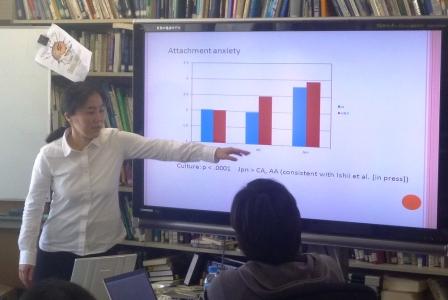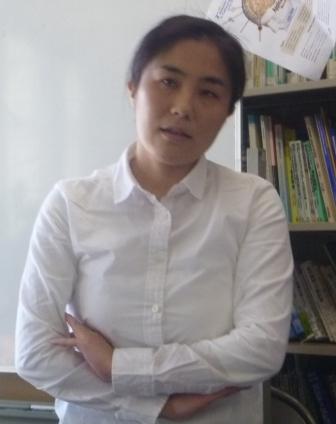※本ワークショップは、北海道大学社会科学実験研究センターとの共催で行われました。
スピーカー: 石井敬子准教授(神戸大学)
発表タイトル:
Cultural norms modulate one’s sensitivity to the disappearance of smiles associated with 5-HTTLPR genotypes.
(Coauthors:
Heejung S. Kim, Joni Y. Sasaki, Mizuho Shinada, and Ichiro Kusumi)
日時: 2011年2月22日(火) 10:00~12:00
場所: 北海道大学文学研究科 E204
参加者: 山岸俊男、結城雅樹、高橋伸幸、大沼進、品田瑞穂、相馬雅代、ほか18名(計24名)
内容: Research has shown that, reflecting a high need to adjust to others’ expectations, Japanese are more anxious than Americans in interpersonal contexts and more vigilant to signs of disapproval, such as the disappearance of a smile from another’s face. Here we explored the extent to which genetic variations in serotonin transporter polymorphism (5-HTTLPR), a short allele of which is more associated with anxiety and risk avoidance than a long allele, contribute to cultural differences in response to the disappearance of smiles. European Americans and Japanese watched both happy-to-neutral and sad-to-neutral movies and judged the point at which the emotional expressions had disappeared. The expected cultural differences in the judgment for the offset of smiles were qualified by 5-HTTLPR genotypes. The offset of smile was faster for Japanese than European Americans in the s/s allele carriers. In contrast, it was faster for European Americans than Japanese in the s/l or l/l allele carriers. The s/s allele carriers judged the offset of smile slower than did the s/l or l/l allele carriers in European Americans, suggesting that in a culture with low need to adjust to others’ expectations, genetic variations have an impact on judgment such that s/s allele carriers, who are considered to have difficulty in evaluating others properly, respond more carefully. In contrast, there was no difference between the two groups in Japan, a culture with high need to adjust to others’ expectations. These findings indicate that cultural norms modulate one’s sensitivity to emotional cues associated with 5-HTTLPR genotypes.
 
▲ ワークショップ一覧
|